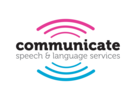
Communicate SLT Community Interest Company (CIC) is a not-for-profit organisation, providing speech, language, and communication services in the North West of England. Our vision (aim) is to facilitate effective communication for all, so that individuals have improved quality of life and reach their full potential.
We achieve this by providing services which support children and young people aged 0-25 years directly and through others. We use high-quality, evidenced-based approaches to maximise impact where they live and learn.
We have been commissioned by Halton Borough Council and NHS Cheshire and Merseyside Integrated Care Board to provide Speech and Language Therapy (SLT) services for children and young people in Widnes and Runcorn.
The services are for all children and young people aged 0-19 years. It will also include young people up to 26 years who have Special Educational Needs and Disabilities (SEND) or whose Speech, Language and Communication Needs (SLCN) are identified in an Education, Health, and Care Plan (EHCP).
Please find below information and answers to questions about the service we’ve been commissioned to deliver, what this means for your child/young person and what to expect during their journey with us.
As the service grows, we will continue to update this webpage.
If you have any queries, please contact us on the details below:
Email: slt.halton@communicate-slt.org.uk
Telephone: 01928 263253 (please note that we may be slower to respond during Spring 2025 as we continue to receive higher than anticipated numbers of enquiries and Requests for Service)
